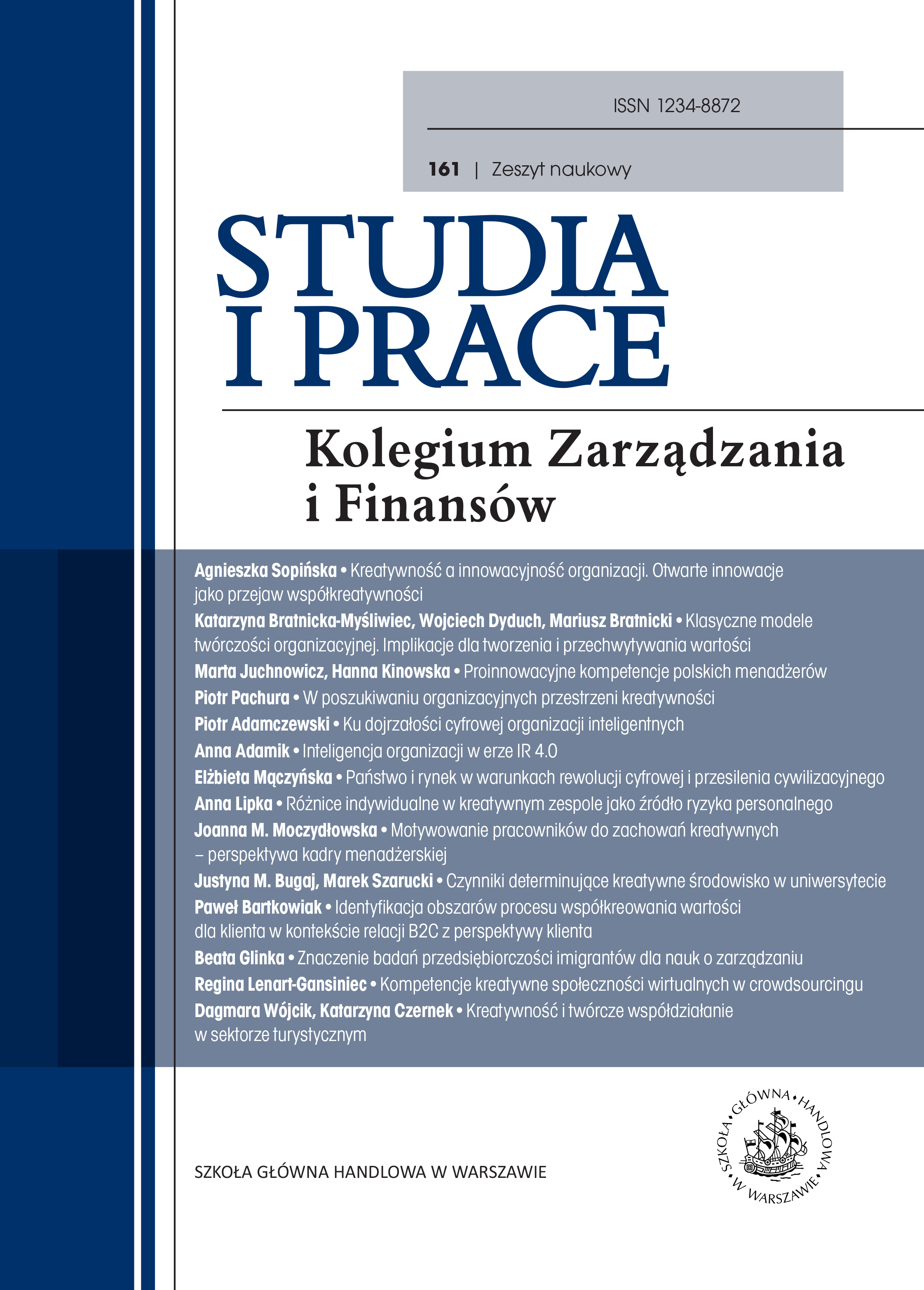Creativity and creative cooperation in the tourism sector
DOI:
https://doi.org/10.33119/SIP.2018.161.14Keywords:
creativity, creative cooperation, experience economy, experience tourismAbstract
An important feature of the rapidly growing tourism sector is creativity and creative cooperation in creating unique experiences, in order to meet still growing expectations of more and more conscious tourists. The creativity component can significantly increase the value of the tourist offer, which in turn may become a strategic tool for managing destinations and achieving a sustainable competitive advantage. On this point, the concept of the experience economy is getting importance and increasing interest of both Polish and foreign researchers. At the same time, its adaptation into the tourism sector represents the concept of the experience tourism. The study focuses on creative initiatives – including creative cooperation – undertaken in the tourism sector. The aim of the article is to exemplify creative activities related to the development of the experience economy in the tourism sector, as well as to present their benefits. Findings were formulated on the basis of individual in-depth interviews, conducted among tourism entrepreneurs in various regions of Poland.
Downloads
References
2. Buczkowska K., Turysta kulturowy – klient nietuzinkowy, w: Kultura i turystyka – wspólnie zyskać!, red. A. Stasiak, Wyd. WSTH w Łodzi, Łódź 2009.
3. Carbone L., Clued in How to Keep Customers Coming Back Again and Again, FT Press, N. J. 2004.
4. Chartrand H. H., Creativity and Competitiveness: Art in the Information Economy, „Arts Bulletin” 1990, no. 15 (1).
5. Dziedzic E., Kaczmarek J., Turystyka w gospodarce kreatywnej, „Folia Turistica/Akademia Wychowania Fizycznego im. B. Czecha w Krakowie: Zarządzanie i transfer wiedzy w turystyce”
2016, nr 41.
6. Gioia D. A., Corley K. G., Hamilton A. L., Seeking Qualitative Rigor in Inductive Research Notes on the Gioia Methodology, „Organizational Research Methods” 2013, no. 16 (1).
7. Graebner M. E., Martin J. A., Roundy P. T., Qualitative Data: Cooking Without a Recipe, „Strategic Organization” 2012, no. 10 (3).
8. Hutter M., Kultura w gospodarce ery kreatywności i doznań, w: Ekonomia kultury. Od teorii do praktyki, red. B. Jung, Instytut Adama Mickiewicza & Narodowe Centrum Kultury, Warszawa
2011.
9. Idziak P., Konkurencyjność muzeów w gospodarce doznań i kreatywności, w: Kultura i turystyka – wspólnie zyskać!, red. A. Stasiak, Wyd. WSTH w Łodzi, Łódź 2009.
10. Kaczmarek J., Paluch M., Kreatywność turystyki vs. turystyka kreatywna – wstęp do dyskusji, „Turystyka Kulturowa” 2015, nr 7.
11. Klastry w sektorach kreatywnych – motory rozwoju miast i regionów, red. S. Szultka, Polska Agencja Rozwoju i Przedsiębiorczości, Warszawa 2012.
12. Kondrat K., Granice innowacyjności w turystyce współczesnej z perspektywy kulturoznawczej, w: Dynamika przemian rynku turystycznego, red. Z. Kruczek, W. Banasik, MSiT, Warszawa
2014.
13. Lund J. M., Nielsen A. P., Goldschmidt L., Martinsen T., The Factory of Feelings. Experience Economy in Danish, Børsens Forlag, Copenhagen 2005.
14. MacLeod N., Hayes D., Slater A., Reading the Landscape: The Development of a Typology of Literary Trails that Incorporate an Experiential Design Perspective, „Journal of Hospitality
Marketing & Management” 2009, no. 18.
15. Majchrzak M., Ekonomia doświadczeń a przewaga konkurencyjna przedsiębiorstwa, „Kwartalnik Nauk o Przedsiębiorstwie” 2014, nr 1.
16. Marciszewska B., Produkt turystyczny a ekonomia doświadczenia, C. H. Beck, Warszawa 2010.
17. Nowacki M., Szlaki dziedzictwa naturalnego i kulturowego drogą ku turystyce kreatywnej, w: Kultura i turystyka. Wspólna droga, red. B. Włodarczyk, B. Krakowiak, J. Latosińska, Regionalna Organizacja Turystyczna Województwa Łódzkiego, Łódź 2011.
18. Pine II B. J., Gilmore J. H., Welcome to the Experience Economy, „Harvard Business Review” 1998, July–August.
19. Pine II B. J., Gilmore J. H., The Experience Economy: Work Is Theatre & Every Business a Stage, Harvard Business School Press, Boston 1999.
20. Richards G., Wilson J., Developing Creativity in Tourist Experiences: A Solution to the Serial Reproduction of Culture?, „Tourism Management” 2006, no. 27 (6).
21. Siggelkow N., Persuasion with Case Studies, „Academy of Management Journal” 2007, no. 50 (1).
22. Stasiak A., Produkt turystyczny w gospodarce doświadczeń, „Turyzm” 2013, nr 23/1.
23. Stasiak A., Triada doświadczeń turystycznych i efekt „wow!” podstawą kreowania nowoczesnej oferty turystycznej, „PN Uniwersytetu Ekonomicznego we Wrocławiu” 2015, nr 379.
24. Stryjakiewicz T., Krajobraz antropogeniczny, przestrzenie kreatywne a turystyka, „Krajobraz a Turystyka”, Prace Komisji Krajobrazu Kulturowego, nr 14, Komisja Krajobrazu Kulturowego
PTG, Sosnowiec 2010.
25. Tourism and the Creative Economy, OECD, Paris 2014.
26. Towards Sustainable Strategies for Creative Tourism. Discussion Report of the Planning Meeting for 2008 International Conference on Creative Tourism, UNESCO Creative Cities, New Mexico 2006.
27. Williams A., Tourism and Hospitality Marketing: Fantasy, Feeling and Fun, „International Journal of Contemporary Hospitality Management” 2006, no. 18 (6).
28. Wójcik D., Gospodarka doznań a sektory kreatywne w dobie innowacji technologicznych na przykładzie sektora turystycznego, „Studia i Prace Kolegium Zarządzania i Finansów” 2017, nr 156.









